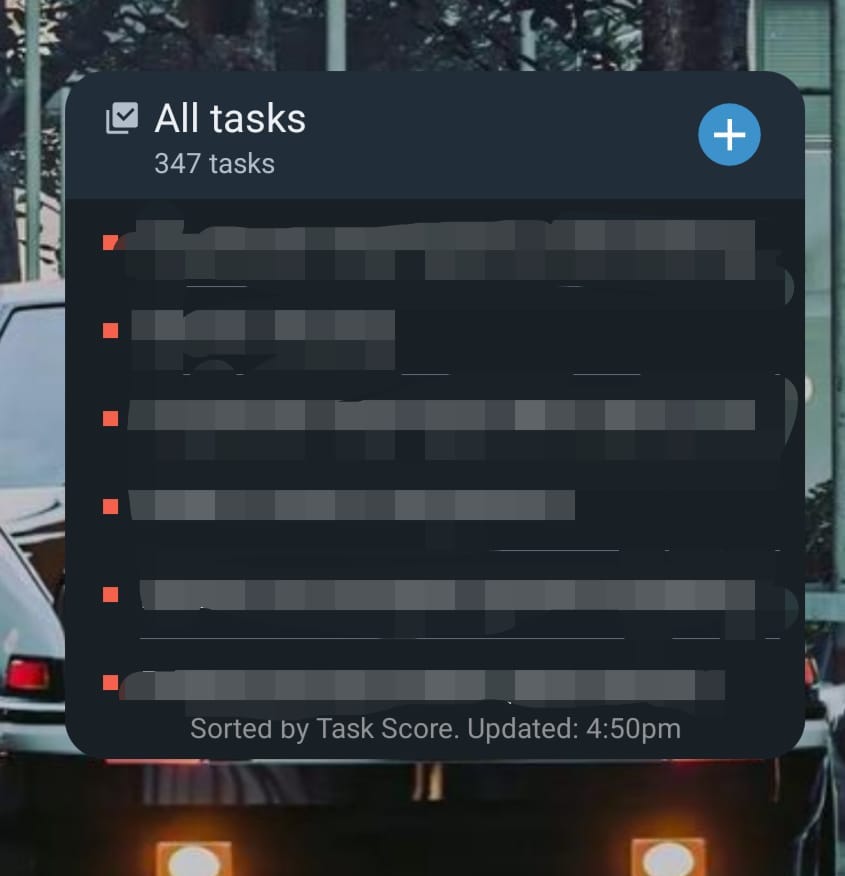Why doing more is not enough

We're constantly nagged to do more, whether it's by our clients, our bosses, or ourselves. Who hasn't had the nagging feeling that they're not doing enough, or that they haven't accomplished anything substantial all day? I'm certainly guilty.
I believed that my procrastination was killing my personal, professional, and academic life, and this led me to pile more tasks on my plate to force myself to do the work I was constantly dreading and avoiding.
The result? Now I have my day job at Amplenote. I'm enrolled in the Write of Passage cohort, have 6 classes of college that come with their own assignments, projects, and exams, in addition to the extracurricular activities and classes I need to graduate.
It has gotten to the point where I have to wake up at 4:30 in the morning to do all of these things.
I'm not proud of it, because even though I'm doing all these things, I still feel like I'm failing in my professional and academic life, like everything I'm doing is of poor quality and I'm not putting in enough work.
"Why can't I do better? Why can't I just do everything on my to-do list on time? What's wrong with me?"
These questions would play over and over in my head, and I would constantly beat myself up for not being able to do all the things I wanted to do. But now I've realized that these thoughts were just stopping me from managing myself better, and I've become a bit better at it - although I'm still a procrastinator with over 300 tasks in my task manager. At least now I can be at peace with that number and work in a more sustainable way.
The illusion of infinite productivity
There are so many success stories out there. People who have created unicorn startups, people who have created new and innovative technologies, people who have discovered new diseases and cures for new and old diseases, and people who have even created and proven their own theories that could change the world! It's amazing what humanity is capable of now. This makes me feel like I have to do more to be as successful as these people, even if I have to make some sacrifices, like taking care of my health.
If I spend more time doing productive things, I'll be more successful and get more out of my time, right?
Right?!
Unfortunately, it doesn't work that way. Humans weren't designed to be productive all the time. We need sleep, food, and exercise to function properly. If anything is missing, our ability to work is compromised, and we end up being less productive overall.
But we're led to believe that we can be productivity machines and push ourselves to exhaustion, working all day while being constantly bombarded with information. It doesn't help that a lot of productivity content is all about "tips to be more efficient" or "how to become an unstoppable worker" and "how to make the most out of your 24 hours".
And with that comes all the unhealthy practices we do when we're overwhelmed: multitasking, working overtime, sacrificing exercise and sleep, or not even getting started!
In an attempt to meet society's demands to do more while trying not to worsen our health and sanity, we put more tasks on our plate than we can handle and end up feeling overwhelmed with all the things we need to do. To counteract these feelings, we spend money on books, courses, and software about productivity tips and methods that promise to "keep us organized and give us more time to work.
But these are nothing more than Band-Aids for the overwork culture that's been pushed on us.
Tasks don’t matter, results matter
The main issue with most people's to-do lists is that they are so overwhelming that it is hard to know where to start. The tasks are numerous, their clarity is abysmal, and of course time is short. We start overthinking each task, wondering if it's really the right thing to do or if we should be doing something else with our time - and suddenly the Xbox controller is in your hands and you're playing that game from your Steam library that you've been dying to play for days.
While playing games is fun, we want to get on with our work and create something meaningful.
To avoid situations like this, we should shift our focus from the tasks themselves to the results they produce. It does not matter if you completed 30 tasks or 3 in a day, what matters is that you accomplished something of value and made progress toward your goals.
There's a quote from Tiago Forte, author of "Building a Second Brain," that I really like about task lists:
“You have to remember that tasks don’t inherently matter – only the results they produce do. If you could get exactly the same results by doing half as many tasks, wouldn't you? [By that measure, you've become twice as productive by doing half as much work!”
This means that we should focus more on what drives results, rather than just aimlessly doing more and more tasks just for the sake of it. But now the real question is: how do I find the tasks that produce the best results?
You should look at your task list and identify some categories that will help you determine which tasks deserve your attention. Some possible criteria are
Important and urgent tasks.
Tasks that are close to their deadline.
Tasks that are important and will give you a lot of personal satisfaction and prestige.
Don’t do more, do less
Doing more doesn't necessarily mean being more productive. Many of the strategies people use will just make you more tired and sometimes even less productive than if you hadn't used them.
Some of my tips that sound counterintuitive, but have worked for me to make sure I'm staying sane with everything I need to do, are
Avoid multitasking: Multitasking is a myth. When you multitask, you're just switching your focus quickly between tasks, which makes you make more mistakes and reduces your overall focus on a task. By focusing on one task at a time, you give it your full attention and spend less energy switching between tasks.
Take frequent breaks: Taking breaks allows you to maintain your energy and focus for longer periods of time, avoiding the sudden fatigue that comes from working too hard.
Work less hours: Working more hours doesn't actively lead to getting more done. Productivity comes from doing more in the same amount of time, so working more hours is counterproductive and will only lead to burnout and error.
Say “no” more often: How often have you been pulled into projects and tasks that drain your energy and don't have anything to do with you? When you have the ability to say no to these tasks, you can focus on the tasks that are most important to you.
How do I manage (or survive?) my schedule
As I said in the introduction, I still face the problem of having way too many things to do, mostly because of my past choices. However, I stopped feeling bad about having way too many things to do after I analyzed my to-do list and came up with a few takeaways.
Keep in mind that these takeaways are from my experience, so you may have a different experience or come to different conclusions than I did.
The first is that I tend to break my tasks into smaller actions, so most of the tasks on my list are subtasks. I don't have an exact number, but at least 50% of them are subtasks. This makes me feel better because I know that my workload hasn't really increased, I've just made it clearer.
Second, most of my tasks are nice to do and not really necessary for me to do. I can put them off as much as I want and the consequences will be minimal. I estimate that about 20% of my (main) tasks are nice-to-do.
Third, most of the tasks that I need to do don't have a set time for completion. I can just do them whenever I find the time.
Fourth, the tasks that are urgent and important will naturally come to my attention several times a week, if not a day. I'll either be constantly reminded by the people who need the task done, or by my task manager app if they're too important or urgent to ignore. This makes up the bulk of the urgent and important tasks that should get my immediate attention.
Conclusion
Fighting that little voice in the back of your head that says you're not doing enough is hard, but not impossible. Take it one step at a time and focus on what really matters to you, not someone else.
When tasks pile up, ask yourself if you're overdoing what you can do in a day, and if you really want to do all these things. Maybe they're just ideals imposed on you by others and may not be the best use of your time.
I hope this was informative and you learned something new.
Smell ya later!



Perfectly relate to the pressure to always do more. Nothing is ever good enough.
My best times, have been when I'm spiritually focused not on the outcome but the process and intention. In my faith, we are taught, God alone determines the outcome. One person may work hard and still get a poor result. Another may be lazy and yet still score top grades. But in the sight of God the one who has has the purest intentions, eg helping others and earning a clean living, not for vanity. That person will triumph when the deeds are weighed in the end of times.
That is only fair, because we don't determine who is born smart, or strong, God does. It's not fair to judge solely on outcome which is what people do, and that is causing unnatural stress. How much I truly embody this enlightened way thinking directly correlates with a healthy resilient mental model. One, not fixated on outcomes and circumstances beyond your control. But totally on things you can. At peace, not wanting to play God by forcing an outcome, yet trying your level best in sincere prayer and quiet steady hard work.